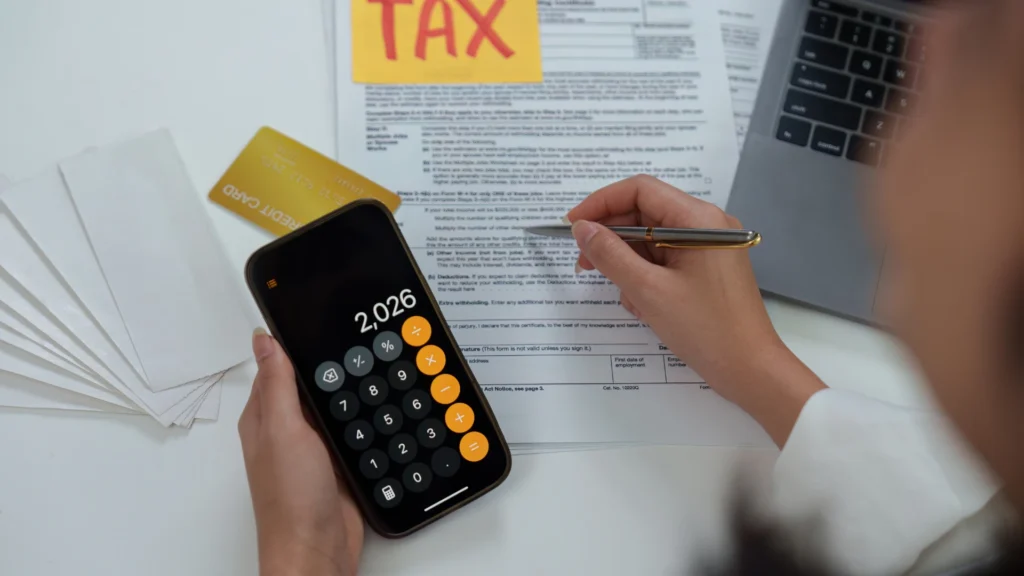Dreaming of sunshine, skyscrapers, and keeping every Dirham you earn? Dubai delivers it all, a global hotspot where your income stays in your pocket. With zero personal income tax, no capital gains or inheritance taxes, and one of the most business-friendly tax systems in the world, Dubai offers residents a luxurious lifestyle with unmatched financial freedom.
The UAE funds public services through oil revenues, modest corporate tax, and a low 5% VAT- not your paycheck. That’s why Dubai continue to attract professionals, entrepreneurs, and investors from around the world. This blog covers the major tax benefits of living in Dubai, key taxes, and how Dubai compares to high-tax countries.
Dubai’s Tax Landscape

Dubai has a worldwide reputation for having a tax system that favors personal wealth. There are no personal, capital gains or inheritance taxes in the community, attracting a lot of professionals, investors and entrepreneurs. Under the Dubai tax system, people can hold onto all their earnings, grow their wealth, enjoy more freedom and a better standard of living than in most other global cities.
Dubai government’s tax policies ensures tax exemption for individuals by depending on other income sources. These measures cover moderate company taxes, taxes on purchases and fees from specific sectors. Even though people do not pay much in taxes, the government maintains enough public funds for important areas such as healthcare, education, infrastructure and tourism thanks to the variety of taxes it levies. Due to its perfect balance, Dubai is an attractive destination for people who aim for both career growth and a great lifestyle.
Understanding the Major Taxes in Dubai
Corporate Tax
Since 2023, businesses in the UAE have to pay 9% corporate tax on their business profits over AED 375,000*, with profits under that amount still liable to no tax. Because of this structure, small and medium businesses are able to retain much of what they earn which helps them succeed and grow. Also, qualifying free zones companies can maintain a 0% tax rate for eligible incomes, as long as they do not do business with the UAE mainland.
There are a few special cases. Beginning in 2025, large multinational companies with yearly global earnings above AED 3.13 billion will have to pay a 15% minimum tax under “Pillar Two”, according to OECD changes. Oil and gas companies are still taxed under old agreements at rates between 55% and 85%, while foreign banks branches are charged a flat 20%. Even with these differences, Dubai’s system for corporate tax is among the most attractive in the world, leading to increased investment opportunities and following worldwide transparency rules.
Excise Tax
Excise duties are put on certain “sin” products in Dubai to discourage people from consuming them. Started in October 2017, all tobacco and tobacco products, e-cigarettes and vaping liquids and energy drinks have been subject to 100% excise tax. Sodas and juices made with added sugar have a 50% tax. When these high rates are set, the cost of products increases, money is allocated for health programs and fewer people want to use harmful products.
Value Added Tax (VAT)
From January 2018, a flat 5% VAT has been used, that is one of the world’s lowest. At every stage of manufacturing, this charge is added to most goods and services. It’s also important that many essentials are zero-rated or exempt such as school and university tuition, most healthcare costs and the first three years of residential property sales. It means households don’t pay taxes on essential needs. GCC VAT also zero-rates business-to-business exports and international transport.
Other Taxes and Fees
In Dubai, no capital gains or inheritance/estate taxes apply. No wealth or gift taxes are charged to individuals. The only significant municipal tax is on real estate: tenants pay a housing fee of 5% of the annual rent, while homeowners pay a 4% property registration tax when they buy a home. Commercial leasing rent is subject to a 5% “market fee.”
The price of these local fees is minor in comparison to what is paid in income or property taxes in different places. Employees in Dubai do not pay much in income tax and residents are exempt from many of the city’s duties. Big profits for businesses are subject to a flat tax at 9% and most government funds come from VAT and specific taxes. Its tax-friendly structure is what often inspires global professionals and investors to go there.
UAE Corporate Tax Updates
To get a thorough understanding, it is worth reviewing the recent corporate tax development in Dubai. Following the 2022 launch of CT, the UAE started using it in mid-2023, as explained in the rate structure. Since that time, important updates have been:
- OECD Pillar Two (Global Minimum Tax): As of January 2025, the UAE will enforce the 15% minimum effective tax on large multinational enterprises (Pillar Two compliance). This “top-up” tax is only applied to foreign multinationals making a global revenue of more than AED 3.13 billion. Most domestic firms and smaller multinationals won’t feel the impact right away.
- Domestic Tax Incentives: The UAE is considering new incentives as part of its domestic tax plan. The Ministry of Finance says it will introduce an R&D tax credit (worth 30 to 50 percent of R&D costs and fully refundable) from 2026. It also prepares to introduce a high-value employment credit (for top executives, lowering the taxes when hiring staff) in 2025. Pending the approval of these plans, innovative and high-skilled firms in the UAE will further benefit from lower taxes (up to 10%) than those currently applying.
- Guidance and Regulations: To ensure compliance, the Federal Tax Authority has outlined in detail how people from free zones should register, as well as how groups of companies can correctly calculate their revenues. In February 2024 the FTA published information on CT such as a guide for free zone companies, outlining the rules for earning a 0% benefit rate. Free zone entities aiming to keep a 0% CT are required by law to comply with economic substance standards and limit their business with the mainland.
All of these developments reveal Dubai’s plan to offer tax savings along with meeting worldwide standards. Dubai’s corporate tax will stay low (approximately 9%) and remain clear and fair and additional relief is coming.
Comparing Dubai with High-Tax Countries

Dubai is globally known for having one of the most attractive taxation systems for people and companies. There are several tax benefits of living in Dubai with very few or no charges in comparison to various nations that raise taxes on income, profits and spending, the difference illustrates the reason many entrepreneurs, investors and professionals are moving to the UAE.
| Tax Category | Dubai (UAE) | United States | United Kingdom |
| Corporate Tax | 9% on profits above AED 375,000 (0% below threshold) | ~25.6% combined federal and state average | 25% flat rate |
| Value-Added Tax / Sales Tax | 5% VAT (introduced in 2018) | No federal VAT; state sales taxes average 6–10% (e.g., TN ~9.5%) | 20% VAT |
| Personal Income Tax | 0% – No tax on salaries or wages | Up to 37% federal + up to 13.3% state = ~50% for top earners | Up to 45% for high earners |
| Capital Gains Tax | 0% for individuals on investments like crypto, stocks, property | 15–20% depending on income and asset type | 10–20%, with exemptions and brackets |
| Inheritance / Estate Tax | 0% – No tax on inherited wealth | Up to 40% of estate value | 40% on estates above a certain threshold |
| Wealth Tax | None | None federally (some state-level proposals) | None |
Key Financial Benefits of Living in Dubai
Moving to Dubai offers favorable tax policies and substantial tax advantages. Here are the key benefits that make Dubai a preferred destination for both individuals and businesses:
Zero Personal Income Tax
Because there is no income tax in Dubai, residents receive their entire salary and freelancing earnings, resulting in significantly greater compensation after taxes than in countries where the government deducts 30-50%.
Low Corporate Tax Rates
In Dubai, companies only pay a 9% tax on their profits above AED 375,000*. This makes the country’s rate very competitive worldwide which leads to more money being put back into the business and used to grow. A 0% tax rate may be applied to income that qualifies for free zones.
No Capital Gains or Inheritance Taxes
There is no obligation to pay taxes on income from stocks, real estate, cryptocurrency, or other investments. Families may easily save their money in United Arab Emirates since heirs are not required to pay any entity taxes, making it possible to pass on the entire inheritance.
Higher Disposable Income
Residents have more money to spend since they are not required to pay income taxes. They can embrace a tax-free lifestyle in this cosmopolitan city. Someone earning $100,000 per year, for example, may save far more than their counterparts in the United States, United Kingdom, or the European Union.
Perfect for Remote Workers and Digital Nomads
Because of Dubai’s visa options and zero income tax, remote employees and freelancers can earn abroad and keep more of their money.
Double Tax Treaty protection
Because of the over 135 double taxation treaties, the UAE reduces or eliminates the chance of people being taxed more than once on the same income. It helps both local people and international investors.
Business-Friendly Ecosystem
Dubai is an economical area to do business due to its low VAT (5%), clear rules, and government incentives. Dubai’s tax regime benefits both new businesses and multinational corporations.
Conclusion
Dubai offers some of the most attractive tax benefits of living in Dubai, allowing residents and businesses to retain a larger share of their income. With no personal income tax, a competitive corporate tax rate, and a moderate VAT, Dubai provides a highly favorable financial environment compared to many other global hubs. These tax benefits of living in Dubai continue to attract expats, entrepreneurs, and investors seeking to maximize their earnings and grow their wealth in a dynamic and business-friendly city.
Navigating Dubai’s VAT laws and regulations can be complex, but with expert support, you can focus on growing your business while staying fully compliant. At Xpert Advisory, we specialize in VAT registration and return filing, providing you with precise, timely support to ensure full compliance and maximize your tax benefits. Get in touch with our experienced VAT experts today!
FAQs
How Do Tax Benefits in Dubai Impact Expatriates Financially?
Dubai’s tax benefits allow expatriates to keep more of their income by eliminating personal income tax, significantly enhancing expats’ financial well-being.
What Are the Dubai Tax Benefits for Expats That Make It Attractive?
Expats in Dubai enjoy zero personal income tax, no capital gains tax, and a favorable business tax environment, making it a highly attractive destination.
Which Tax Benefits of Living in Dubai Should Potential Residents Know About?
Potential residents should know about Dubai’s tax-free environment including zero income tax, no property tax, and tax exemptions on various types of income and investments.


